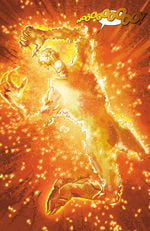Halo: Epitaph - Halopedia Reviews
From Halopedia, the Halo wiki
The staff at Halopedia are happy to present our fourth review of a Halo novel! In this article, we will share our thoughts on Kelly Gay's latest novel, Halo: Epitaph. While the novel was released about a month ago (at the time of publishing this article) and we allow any of its content to be posted to the site, we have ensured that the first half of this review is spoiler-free, with only a few allusions to topics covered in the Chapter 1 preview officially released prior to the novel. You can safely read the first five questions if you have yet to complete the novel yourself, but make sure to avoid the second set of questions and the summary section!
If you would like to experience the novel for yourself, you can find it at Amazon (US or UK), Forbidden Planet, Simon & Schuster, Waterstones, and Barnes & Noble.
Given that collaboration between people of varied opinions and backgrounds is core to the concept of a wiki, our review consists of a number of talking points with multiple editors giving their thoughts individually. This time, we’ve got Halopedia staff members X, X, Sith Venator, and TheArb1ter117!
Please note that we were not asked by 343 Industries, Microsoft, or any other party to produce this review, nor were we asked to promote or praise the book.
Spoiler-Free Questions
Question 1
What are your overall thoughts on Halo: Epitaph? Was it what you expected?
TheArb1ter117: I'm a Halo fan who previously considered the Forerunners and the time period when they were at their height to be one of the least interesting aspects of Halo's overall story. I enjoyed Greg Bear's Forerunner novels (particularly Halo: Silentium), but there was always something keeping me from being fully engrossed in the setting and the characters. However, I can confidently state that this feeling has changed since reading Halo: Epitaph. Despite previously having difficulty in connecting with the characters of the Forerunner era, this novel grabbed my attention like no other and I enjoyed every minute of it.
Sith Venator: Since I've liked essentially all the Forerunner centered stories (Special shout out to my guy Defender of the Storm) barring Halo: Primordium, I assumed correctly I would like this one as well. Though it might be a new favorite!
Question 2

Prior to Halo: Epitaph, the last major appearance of the Ur-Didact was in Halo: Escalation's "The Next 72 Hours" arc, in which John-117 defeats the Forerunner. It's evident that many fans thought that this was the the end of the Ur-Didact. Without spoiling anything, how do you think his "survival" of these events was handled in Halo: Epitaph?
TheArb1ter117: When a being is digitized by the Composer (or several Composers, in the case of the Didact), they are not simply killed. The essences of composed beings live on in the digital world much like ancillas, although through a much more painful process than those typically used in the creation of ancillas. As such, it is no surprise that the Didact "survived" his composition. However, I do not blame fans for thinking this was his final fate, or even that he was killed at the end of Halo 4. I think Kelly Gay did a wonderful job of retelling important moments through the Forerunner's eyes, explaining his emotions surrounding the events. She makes it clear that while the Didact may have technically "survived," he by no means the same person he was before—and that he will never be the same again.
Question 3
Since the reveal of the novel's official summary over a year ago, it was made clear that Halo: Epitaph would serve as the conclusion to the Ur-Didact's story. Without revealing his fate, how would do you think this major player in the Halo universe's overall storyline was handled in Halo: Epitaph?
TheArb1ter117: It is not surprising to me at all that Halo: Epitaph would serve as the conclusion to the Didact's story, and it believe that a novel is a fitting medium for his send-off. While I loved the Didact as Halo 4's antagonist, he is a character of the novels, and I think that only a novel like Halo: Epitaph could give an appropriately deep dive in the psyche and personality of such an influential character to Halo's overall story. Kelly Gay does not waste this opportunity, crafting a final adventure and character arc for the Didact which allows him to continue to influence the greater universe in major ways while also letting him explore his own mind and personal goals.
Question 4
Is there any other Halo media that you think fans need to play, read, or watch before picking up Halo: Epitaph? Or any that you think would simply enhance the reading experience?
TheArb1ter117: The late, great Greg Bear's Forerunner Saga is a must-read, and I would highly recommended that fans have also played Halo 4, Halo 5: Guardians, and Halo Infinite prior to reading Epitaph. Reading The Next 72 Hours, the Rion Forge & Ace Of Spades series, and Halo: Fractures (particularly Promises to Keep) would also enhance the reading experience. While this is certainly a long reading list, the Didact is one of the most influential characters in Halo lore, so it is not surprising that many stories connect to him. Yet, one of my friends who read the book has only played the games and he still massively enjoyed it, so take that as you will.
Question 5
For fans who haven't read many (or any) of the previous Halo novels and are unsure if they should read Halo: Epitaph next (or even start their journey into the Halo novels with it), what advice would you give to them? For the fans who have read many of the previous Halo novels, which novels would you say feel most like Epitaph?
TheArb1ter117: As is implied by the very name of the novel, Halo: Epitaph is an ending to a storyline. As such, I would try to dissuade any fan from making it their introduction to the Halo novels. And while I do argue that fans should at least read The Forerunner Saga prior to reading Epitaph, I would not start there either. These novels are very different from the games, not focusing on action as much as they focus on characters and settings. As always, I recommend that fans who want to get into the novels start with Halo: The Fall of Reach. It is difficult to compare Epitaph to any previous novels as none are really quite like it. At most, I can liken some of it to aspects of Halo: Primordium and Halo: Point of Light, but I find it difficult to explain further without spoiling things.
Spoiler Questions
Question 6
TheArb1ter117: There were so many amazing moments throughout this book that it is impossible for me to isolate a favorite. However, one of my favorites was the implication that Offensive Bias helped the Weapon during John-117's final fight with the Harbinger. While assisting John against the Harbinger, the Weapon states "There's something else here. Something's helping me..." Given the hologram of Offensive Bias within the Silent Auditorium, I had always assumed it was the ancilla helping the Weapon. When the Didact enters the Silent Auditorium, he all but confirms the presence of the Metarch-class ancilla he helped create:
| “ | Indeed, all he could discover about the function of the chamber was its designation: the Silent Auditorium. Any further probing as to its purpose was impossible due to an aggressive firewall, created by someone or something very old, very powerful, and, oddly, very familiar. The complexity perhaps of, at minimum, a Metarch-class ancilla… | ” |
Question 7
Question 8
Question 9
Question 10
Summary
Ultimately, we at Halopedia... We have agreed on giving the book a rating of X.X/10!
This concludes our four review of a Halo novel! We will be continuing this with Jeremy Patenaude's Halo: Empty Throne later this year, so any feedback on the format and content of this review is appreciated! In the meantime, you can check out our reviews of Halo: Divine Wind (here), Halo: The Rubicon Protocol (here), and Halo: Outcasts (here).
We’ll leave you with some Halo: Epitaph-themed memes originating from Halopedia staff discussions about the novel, arranged in order of appearance:
